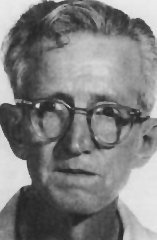To understand the importance of Gideon vs Wainwright--the landmark case guaranteeing legal representation for all Americans, no matter how poor--you must travel back in time to June 1961, to a typically sultry evening in the Florida Panhandle.
The Bay Harbor Pool Hall and Bar was a popular hang-out in eastern Bay County, and Clarence Gideon, 51, a local ner'do'well and petty thief, was a regular patron. On the evening in question, a case of beer, four fifths of wine, and a handful of quarters turned up missing from the bar. Later that night Panama City police questioned Gideon at a local motel and found $25 in change stuffed in his pockets.
Gideon was promptly arrested, tried, convicted, and sentenced to five years in the state prison at Raiford--all without benefit of attorney. (Typically, indigent defendants were provided legal council only in capital cases and special circumstances).
From his prison cell, the eighth-grade drop-out wrote a letter, in pencil on jail stationary, petitioning the United States Supreme Court to grant him a new trial. The Sixth Amendment to the US Constitution, Gideon argued, granted all citizens accused of a crime the right to an attorney.
The Supreme Court concurred and returned Gideon to Bay County for re-trial. "Someone--another inmate, I think--mentioned my name to Gideon," retired attorney Fred Turner said, "and he asked me to represent him."
At the retrial, held in 1963 at the Bay County Courthouse, Turner picked apart the state's case: "How could he have stolen a case of beer?" he asked. "No one saw him with any beer. And wouldn't Gideon, a penny-ante gambler, be expected to have a pocketfull of loose change?"
The jury acquitted Clarence Gideon.
Reverberations of Gideon vs Wainwright are felt every day, in every courthouse in America. The case ensured that every defendant would be represented in court by an attorney, and created public defender's offices to handle cases involving defendants too poor to afford an attorney. Gideon vs Wainwright, wrote Robert Kennedy, "changed the course of American legal history."
The case even inspired a best-seller: Gideon's Trumpet by New York Times reporter Anthony Lewis. In 1980, the movie version of Gideon's Trumpet was filmed (largely at the Bay County courthouse) and starred Henry Fonda as Gideon.
The real Clarence Gideon managed to stay out of trouble the rest of his life and died in Ft. Lauderdale in 1972. "He never realized," Turner said, "the importance of his case."
Unquestionably Gideon vs Wainwright made a local legend out of Fred Turner, who was born and raised in the same area of eastern Bay County where the Gideon drama played out in 1961.
Born in Millville--at the time, a tiny impovershed community outside Panama City--in 1922, Turner, the son of a carpenter, joined the Air Force after graduating from high school. In 1945 he entered the University of Florida, where he served as student body president before graduating in three years--with a law degree, yet. Turner returned to his hometown and practiced law until his election in 1979 as circuit judge. He retired in 1991, and was, I'm proud to say, a frequent golf partner of this reporter.
Once, the Judge and I were at Nature Walk golf course in Lynn Haven, just outside Panama City. On the par three seventh hole Fred mis-hit his tee shot, the ball never rising more than a foot off the ground--the dreaded "skull shot," in golf-lingo. The ball bounced five or six times before rolling onto the green and into the cup for a hole-in-one. No one has ever taken more ribbing, or laughed harder, than the Judge himself. We got back to the clubhouse and Fred bought drinks for everyone in the place, adding this toast: "May I live to 100 and be shot to death by a jealous husband."
Fred Turner didn't make it to 100; he died in November 2003 of heart failure at the age of 81, and his obit made no mention of a spurned spouse.
Three months before his death, Turner was the featured honoree at ceremonies held at the Bay County courthouse, where a plaque was unveiled commorating the 40th anniversary of Gideon vs Wainwright, and the momumental contribution to American jurisprudence made by one local ner'do'well and his small-town attorney
--Ken Brooks
Yesterday in Florida magazine, Issue 14
skip to main |
skip to sidebar

Clarence Gideon


Gideon's original petition

Fred Turner in July 2003, prior to the official unveiling of the plaque commorating the 40th anniversary of Gideon v Wainwright.


Fred Turner and the Gideon v Wainwright case. BY KEN BROOKS.

Clarence Gideon


Gideon's original petition

Fred Turner in July 2003, prior to the official unveiling of the plaque commorating the 40th anniversary of Gideon v Wainwright.


No comments:
Post a Comment